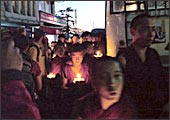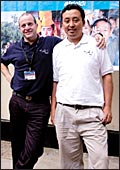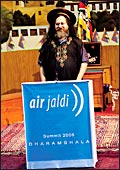 |
| Getting connected: The summit did make
a point, but left a lot to be desired |
OCTOBER
23-25, 2006
McLeodganj, Dharamshala, Naddi, Himachal Pradesh
Nestled
in the shadow of the 7,000 metre-plus Dhauladhar range, McLeodganj
would seem the strangest place to hold a summit of any kind. But
AirJaldi, which sold itself as the "World's Highest Wireless
Conference", wanted to be different. Wireless? In McLeodganj?
A place more famous as the residence of the Dalai Lama and for
attracting hordes of pro-Tibetan Hollywood stars. Surprisingly
enough, the McLeodganj-Dharamshala area of Kangra district in
Himachal Pradesh is one of the few wide-area wireless mesh networks
providing broadband access to some of the most inhospitable terrain
in the world. This idea was the brainchild of a one-time Israeli
army Major Yahel Ben-David, a long-time 'Free Tibet' activist,
who has made a second home in these hills. "The reason we
started this network was that there was no reliable way of connecting
these people to the world," says Ben-David.
Internet services before the AirJaldi network
started up were patchy and available only in major population
centres such as McLeodganj. Within days of the government allowing
outdoor wireless connectivity, the Dharamshala wireless mesh was
underway. Today, the mesh provides access to over 50 different
offices of the Tibetan government-in-exile and its ancillaries.
And they have done this in terrain that reaches up to 10,000 feet
through deep gorges and oppressive weather. And as Phuntsok Dorjee
of the Tibetan Technology Centre, the organisation that installed
and maintains the service, points out, this was done by a team
of only three (now four) people working on weekends. "And
we have to face lightning strikes and monkeys, who for some reason
like chewing on routers," he laughs.
 |
| Wi-Fi takes a backseat: Tibetan monks
holding a candlelight procession against Chinese oppression |
Given this backdrop, maybe holding a wireless
connectivity summit at this (very cold) location was not a bad
idea. The problem was how could the summit steer clear of the
obvious political connotations? Well, the answer was to not even
try. The Hermann Gmeiner (remember the Brad Pitt-starrer Seven
Years in Tibet?) Hall at the Tibetan Children's Village at Naddi,
a short trek from McLeodganj, was the venue for the summit, and
the audience seemed full of do-gooders with a tremendous understanding
of technology, but for whom the terms 'capitalism' and 'commercial
viability' were dirty words. After all, this was all about 'community
networks', a euphemism for 'free'.
Thankfully, The Dalai Lama recognised that
this is not the case and while he could not come himself to the
summit, his letter to the summit made that point. "By itself,
the internet cannot feed the poor, defend the oppressed or protect
those subject to natural disasters. But by keeping us informed,
it can allow those of us who have the opportunity to give whatever
help we can," he wrote.
However, if one went to the summit expecting
to get answers about technology and viability, which is what a
lot of local Indian delegates like Ashish Soni, a Visakhapatam-based
entrepreneur, had gone to get, there were no answers. "I
wanted to discuss the feasibility of running a Wireless Internet
Service Provider (wisp). Would people pay for such a service,
what has been the experience across the world?" he said.
However, he did admit that the summit had brought him in contact
with some people from across the world who do have solutions.
Yet, he felt the conference should have touched on legal and regulatory
issues.
 |
 |
| Spread the word: (left)
Ben-David and Dorjee (in white tee), and Richard Stallman,
who was advocating the virtues of free software at the summit |
Other local delegates felt that using Wi-Fi
connectivity as the solution was not the answer in India, where
mobile networks (from competing networks) have reached every nook
and cranny of the country. This correspondent had almost constant
mobile access. Sherrin Issac John, a South African delegate, believes
that this opinion was missing the point. "There are different
horses for different courses, and while next-generation mobile
networks in a densely-populated country like India could feasibly
provide high-data rates, in isolated pockets, and sparsely populated
areas like Africa, Wi-Fi can play a big role."
David Hughes, a retired us Army Colonel, was
one of the few delegates who realised that any wireless network
has to be viable. "If it is not, it will not survive. However,
if you can teach local people the ways and means of operating
such a network, they can make money out of it, even if it is a
community network," he said. "Bandwidth can be cheap,
but not free. But in areas which are underserved or don't have
broadband at all, a wireless mesh network is the fastest and cheapest
way to spread broadband access," he added.
The summit promised much in the way of hyperbole,
but delivered little in the way of new knowledge. Local Tibetans
admitted that the wireless mesh network had provided them a new
means of getting stories of 'Chinese aggression' out faster, 'community
wireless' was a means of expression over here. At the close of
the second day, back in McLeodganj, a candlelight march was held
by the Tibetans to protest against the Chinese. There were a lot
of foreigners in the crowd, including several delegates. As this
correspondent saw it, politics and technology go side-by-side
in this community of exiles.
|








